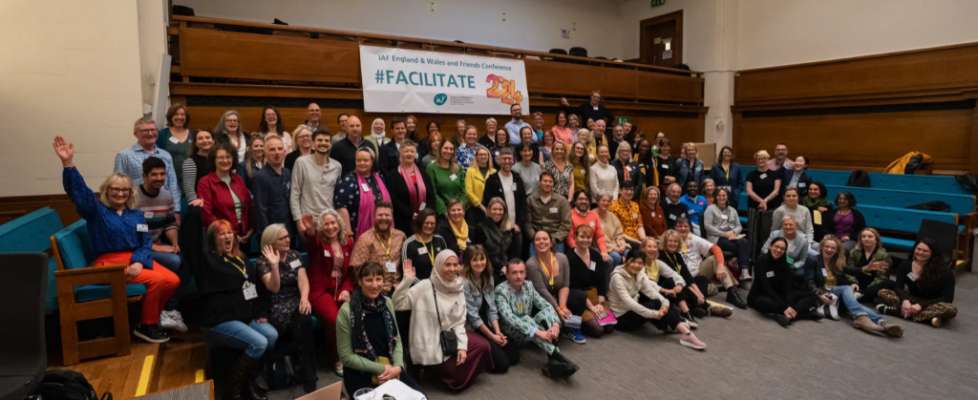On the warm feeling of spending time with my tribe
This year I went to the annual conference of the IAF (International Association of Facilitators) England and Wales chapter held in the Priory Room in the centre of Birmingham on the 25th and 26th April. I’d been once before, a couple of years ago, but that was a hybrid mix of ‘roomies and Zoomies’, which was tricky. I enjoyed this one much more, though it was very intense, with lots of sessions interspersed with breaks, when I had time for only a few of the fascinating conversations that were possible. On the second day I had to escape at lunchtime and watch the football in a pub to have some energy left for the afternoon. It was immaculately organised by a team of volunteers who had given much of their time to it over the previous months. I recommend it to any facilitator, however new, however long in the tooth.
I went to eight one-hour sessions over the two days. Because it was so intense, by the end I could only remember a couple – and one of those was a session I gave. But I have my notes… Just to pick out a few, I learned much from two sessions on anti-racist facilitation, the current and vital theme of the IAF in England and Wales. I appreciated the very last session, run by Amelia Wakeford and AMC Newton, because they understood our great need for time and tools for digesting all the other sessions before we all – sadly – went our separate ways. I made a collage of everything that had stuck with me.
The session I enjoyed most was called The Art of Visualisation, presented by Amaia Lesta Sobrino and Ainhoa Montero. Walt Disney once said, “If you can dream it you can do it” – their theme was, “If you can see it you can do it”. And the reason I liked it so much was that I used to use visualisation a lot – but somehow I forgot about it.
My session was called Renewing Consensus, a title that will not come as a surprise to those familiar with Rhizome. It was a taster for a process called the Win-Win Workout that colleagues and I have been developing over the last four years. I said that it offered three insights
- How gamification can reduce the need for facilitation – valuable when you want to break into small groups, without enough facilitators to have one per group.
- The value of distinguishing between the ‘what’ and the ‘why’. Much of today’s polarised politics takes place at the level of policy and solutions – what should be done about some issue. Consensus is much easier to find at the level of needs, values and principles – the why. This four-minute video explains how to get from the one to the other.
- The Win-Win Workout demonstrates a paradox – that it is possible to use competition to promote cooperation. They are not the mutually exclusive alternatives that they are so often thought to be.
The taster concerned assisted dying. (See here for a fuller blog on another Win-Win Workout on this issue). In groups of three, each person took on one of these three positions:
- Yes to legalising assisted dying: on the basis of autonomy and compassion for suffering
- No: on the basis of the risk of a slippery slope and lack of protection for those who are vulnerable, for instance because of disability
- Conditionally yes: provided there are strict medical and legal frameworks
Each group had to come up with a statement of common ground. Then everyone voted on which of these statements they – as someone holding their position – could live with and even support. The winning statement was: “The legalisation of assisted dying within a carefully regulated medical and legal framework that upholds individual autonomy and ensures that vulnerable individuals are not coerced into ending their lives prematurely.
One of the participants endorsed the value of taking on a role in their feedback: “Me and another person in my group had some personal connections to this topic. I was glad I was given a persona so didn’t have to talk about my own views.”
All in all, a great mix of ideas new and old, friends likewise.
Perry

